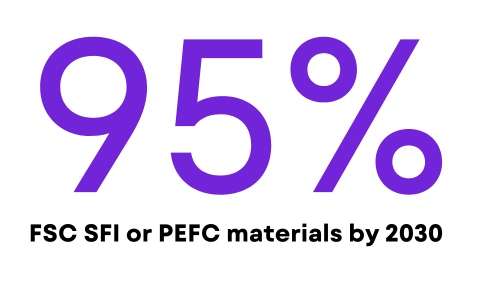adm’s Path Forward: Embarking on Our Corporate Biodiversity Journey
Biodiversity holds crucial significance for humanity and the corporate world. With raw materials we source, the products we manufacture, and the services we provide, biodiversity – the diverse array of life on earth - provides the foundation for business activities in more ways than we realize. Our businesses depend on stable and resilient ecosystems to operate effectively.
Healthy forests, functioning wetlands, and diverse marine environments all contribute to the stability of our supply chains and the overall economy. When biodiversity declines, the risks to our operations increase, whether it's due to disruptions in resource availability, regulatory changes, or reputational damage.
Biodiversity is under threat like never before. As humanity's footprint expands, ecosystems suffer, and species disappear at an alarming rate. The corporate sector, with its vast global reach and significant influence, stands at a critical juncture to either exacerbate this crisis or become part of the solution.
For years, the corporate landscape has primarily focused on reducing carbon emissions and promoting energy efficiency as cornerstones of sustainability. While these endeavors are undeniably important, they represent only a partial solution to the intricate ecological challenges we face. There is growing recognition that biodiversity conservation should be regarded with equal importance to emissions reduction in corporate sustainability strategies.
At adm Group, we recognize this responsibility, and we're committed to charting a course towards a more biodiverse-friendly future. Enterprises like ours, operating in a global marketplace, have immense power to shape the fate of biodiversity.
Here's how we're stepping up to the challenge:

Setting Ambitious Targets
adm has pledged to reduce absolute greenhouse gas emissions by 50% by 2030, with a further 90% reduction by 2040 from a 2021 baseline year. These targets directly impact biodiversity by curbing emissions that drive habitat destruction and climate change, both of which are key drivers of biodiversity loss.
Engaging Suppliers for Change
We understand that our supply chain is a critical link in the biodiversity chain. That is why we are working with approved suppliers to transition to renewable energy sources. By relying on wind, solar, and other renewable energy sources, we can reduce the need for environmentally harmful practices like fossil fuel extraction. This shift helps preserve habitats and ecosystems, safeguarding biodiversity from the adverse effects of habitat destruction, pollution, and climate change associated with traditional energy sources.
Sustainable Sourcing and Packaging
Our commitment to sourcing 95% FSC, SFI, or PEFC certified materials for print items and ensuring 100% reusable, recyclable, or certified compostable packaging for all items by 2030, underscores our dedication to minimizing biodiversity impacts throughout our product lifecycle.

Collaborative Initiatives
We are proud to be part of the Nature & Biodiversity Peer Group, where we collaborate with industry peers to share best practices, identify challenges, and drive collective action towards biodiversity conservation.

Biodiversity Workshops for Employees
For Earth Day this year, adm’s global offices hosted urban environmental advocate Kalpana Arias. Kalpana stressed the importance of preserving global biodiversity and our shared responsibility, as individuals and as a corporation, to actively engage in conservation efforts. She highlighted the benefits of urban greening, promoting mental health, community cohesion, and skill development. Embracing such initiatives not only beautifies our cities but also fosters a healthier planet.
As our clients increasingly emphasize the importance of biodiversity in corporate sustainability efforts, adm is committed to leading by example. By integrating biodiversity considerations into our operations, supply chain, and product design, we are not only minimizing our ecological footprint but also safeguarding the web of life we all depend on.
Biodiversity is not just a concern for environmentalists – it is a fundamental business issue. Recognizing and safeguarding biodiversity is not just about doing the right thing, it is about ensuring the long-term viability and success of our companies in a rapidly changing world.

